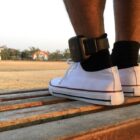
In late September, Torri was driving down the highway with her 11-year-old son Junior in the back seat when her phone started ringing.
It was the Hamilton County Sheriff’s deputy who worked at Junior’s middle school in Chattanooga, Tennessee. Deputy Arthur Richardson asked Torri where she was. She told him she was on the way to a family birthday dinner at LongHorn Steakhouse.
“He said, ‘Is Junior with you?’” Torri recalled.
Earlier that day, Junior had been accused by other students of making a threat against the school. When Torri had come to pick him up, she’d spoken with Richardson and with administrators, who’d told her he was allowed to return to class the next day. The principal had said she would carry out an investigation then. ProPublica and WPLN are using a nickname for Junior and not including Torri’s last name at the family’s request, to prevent him from being identifiable.
When Richardson called her in the car, Torri immediately felt uneasy. He didn’t say much before hanging up, and she thought about turning around to go home. But she kept driving. When they walked into the restaurant, Torri watched as Junior happily greeted his family.
Soon her phone rang again. It was the deputy. He said he was outside in the strip mall’s parking lot and needed to talk to Junior. Torri called Junior’s stepdad, Kevin Boyer, for extra support, putting him on speaker as she went outside to talk to Richardson. She left Junior with the family, wanting to protect her son for as long as she could ...

TUCSON, Arizona — Adriana Grijalva was getting ready to head to class at the University of Arizona in the fall of 2022 when she got a text message from her cousin telling her to stay put. The cousin, who works in maintenance at the university, had watched law enforcement descend on campus and reached out to make sure she was safe. A former student had just shot a professor 11 times, killing him.

Equal Justice USA (EJUSA) announced October 8 that it will partner with four new communities to build new restorative youth justice diversion programs. Restorative justice includes an accountability process that identifies root causes of youth criminal actions, while providing an opportunity for healing both for the person harmed and the person who has caused harm.

Louisiana is the only state to pass and then reverse Raise the Age legislation. Louisiana’s criminal justice system now treats all 17-year-olds as adults. Is reversing Raise the Age making a difference in the number of violent crimes by 18-year-olds?
More Headlines

Imagine waking up each morning with no hope for the day ahead, navigating a minefield of potential conflicts with your body on high alert. That was my reality as a marginalized youth — misunderstood, labeled as a troublemaker and cast out without a chance to reconcile and evolve. Growing up with anxiety in school is an all-too-common experience that perpetuates a cycle of fear and resentment. It’s time to acknowledge and address this narrative that adversely affects our youth’s learning experiences and the education system. Restorative justice programs are part of the solution.

After decades of neglect, the youth justice field is awakening to the importance of diversion in lieu of arrest and formal court processing for many or most youth accused of delinquent behavior.

The juvenile court system is supposed to ensure that young people accused of crimes have legal representation, even if their families can’t afford a lawyer. But in Cuyahoga County, some courtrooms resemble hiring halls for favored attorneys who get hundreds of assignments yearly, while others get none.

The commissioner of the Tennessee Department of Children’s Services publicly said this month that the agency was working with lawmakers to address oversight gaps at juvenile detention facilities across the state. But behind the scenes, the department is working to water down a bill that would do just that, according to one of the bill’s sponsors and others working on the legislation.

Last Saturday, a San Bernardino sheriff’s deputy shot and killed Ryan Gainer, an autistic Black 15-year-old, outside his home in Apple Valley, California. The shooting, which is under investigation, came after Gainer chased the deputy with a large bladed garden tool, according to police and body camera footage released by the department. The teen’s family had called 911 when he became upset during a disagreement, broke a glass door and struck a relative. They told CNN that by the time deputies arrived, Ryan had calmed down and apologized.

For the past few years, guns have been identified as the leading cause of death for children in the United States. There were 2,571 children age 1 to 17 who died in shootings in the U.S. in 2021, 68% more than the 1,531 that occurred in 2000.

In February 2024, officials in Massachusetts requested the National Guard be deployed to a more unexpected location – to a high school.
Brockton High School has been struggling with student fights, drug use and disrespect toward staff. One school staffer said she was trampled by a crowd rushing to see a fight. Many teachers call in sick to work each day, leaving the school understaffed.

What message has the court just sent?
The court decision in Texas – and the no-long-hair policy in the Barbers Hill Independent School District – might seem outdated, misinformed or at odds with best practices for culturally responsive education. But as I and other researchers have found, strict monitoring and other anti-Black practices – such as those regarding Black children’s hair, bodies, language, clothing and even their presence – are widespread in America’s schools.
What options do Black students have?
What should school leaders consider?











